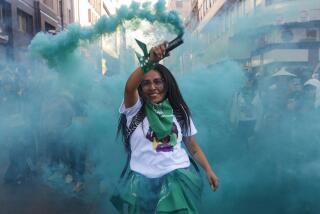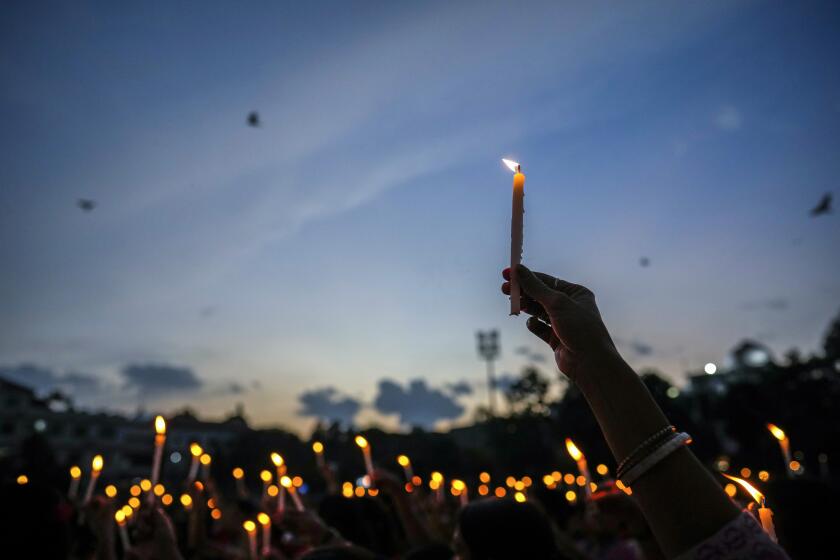Disappointed Eastern Germans Turn Right
Across the road from the shuttered sawmill, a man with a shaved head sat behind the counter of the Crime Store, a neo-Nazi boutique selling camouflage thong underwear and CDs with titles such as “It’s Our Europe, Not Theirs” and “Rockin’ the Reich Volume II.”
Business, the man said, was good. In this hard-pressed eastern German town, prospects also are strong for the right-wing National Democratic Party, or NPD, which emerged decades ago from the ideological ruins of the Nazi regime. With many in this part of Saxony state feeling betrayed by the country’s main political parties, the NPD nearly doubled its support in local elections last June, winning 21% of the vote in Koenigstein.
Much of the right wing’s success is rooted in the failures of German reunification since the end of the Cold War. Beginning in the mid-1990s, the NPD targeted poor cities in the east, marketing its xenophobic rhetoric while trying to tame a radical fringe of skinheads. Although still yearning for an ethnically pure “fatherland,” the party has become more populist, working on local problems such as schools and roads to help enhance its stature.
Few members are suggesting a renaissance of right-wing political enthusiasm, but high unemployment, trimmed social programs and a loss of pride among laid-off workers are strengthening support for extremist politicians. In September, the NPD won 9.2% of the vote in Saxony, giving it an unprecedented 12 seats in the state parliament. The party is not a factor in national politics, but its members are getting elected to town and regional councils. The NPD and other radical right-wing parties have 313 politicians serving in municipal governments across Germany.
Uwe Leichsenring embodies the NPD’s shift in personality and tactics. The pudgy-cheeked owner of a driving school was once investigated by German intelligence for his association with the SSS, a banned radical group known for violence toward immigrants. Today, he is an NPD voice on the Koenigstein council and in the Saxon parliament, where he wears button-down shirts and speaks of the ills of globalization and of “reconstructing the national identity” of Germans.
“NPD is a party that wants to win people, not shock them,” said Leichsenring, whose office in the Saxon capital, Dresden, looks over blackened buildings restored after the Allied bombing of World War II. “Many people are quietly sympathizing with us because they can’t publicly support us. We get a lot of faxes of support. If we had freedom of opinion in our country, and the political establishment wasn’t trying to destroy us, the ranks of our party would swell.”
Frieder Haase, the independent mayor of Koenigstein and a vigilant opponent of the NPD, has known Leichsenring for years. He attributes the right wing’s growing support to some members’ folksy, underdog appeal. “NPD members like Uwe Leichsenring wear nice clothes and come across as the nice neighbor,” he said. “He’s local and likable and people don’t see him as the brown [Nazi] danger.”
The broader appeal of the NPD is difficult to assess. The party’s presence on the political landscape is largely reviled and viewed as a lingering apparition that represents the worst tendencies of a people. But for some eastern Germans, the NPD is one of the few voices extolling national pride, a passion that has been suppressed since the end of World War II.
NPD critics and even some members acknowledge that the party has limited resonance and that its victory in Saxony resulted from a protest vote by easterners against German Chancellor Gerhard Schroeder’s Social Democrats and the opposition Christian Democratic Union. Schroeder has been criticized and sometimes demonized for failing to bring down the east’s 18% unemployment rate.
“People are depressed. Things haven’t gotten much better in east Germany since the Berlin Wall fell,” Anke Moede said, slicing meat in her husband’s butcher shop in Koenigstein. “We didn’t go through a revolution to end up in this mess. Sometimes I think I’d go back to the old communist days. I don’t have to smoke Marlboros.”
Anger and disillusionment led to the largest right-wing rally in years when 5,000 neo-Nazis marched through Dresden in February to mark the 60th anniversary of the Allied bombings, which killed at least 25,000 Germans. Saxony’s NPD leader, Holger Apfel, referred to the bombings as a “holocaust.” He and his party once walked out of parliament during a minute of silence to remember Jews and other people killed by the Third Reich.
“It’s natural the big political parties are scared of us,” Leichsenring said. “We want Germans again to be the landlord of their own house.... If you speak of German pride, you’re immediately put into a right-wing box. The political parties want to prevent something from bubbling up that bubbled up 70 years ago. They want to stamp out any sense of national emotion.”
Such establishment sentiments have led to the national government’s unsuccessful attempts to ban the NPD as racist and anti-Semitic. Schroeder has decried the NPD, saying: “Germany is a free, democratic nation. And everything connecting us to the [Nazi] cesspool damages us, damages Germany and damages our standing with international investors.”
The NPD’s political ambitions are drawn more from hyperbole than specifics. The party’s broad agenda includes remaking the German government with nationalistic ideals, limiting immigration, taking Berlin out of international organizations such as NATO and resisting globalization and the expansion of the European Union, both of which, according to the NPD, are weakening the nation’s economy.
Right-wing extremists, however, have not gained entry to the polished hallways and anterooms of the German Parliament. Instead, the NPD toils in struggling hamlets and towns along the Elbe River, where miles of crumbling factories reveal the brittle underside of the east. In places such as Koenigstein, with its medieval fortress rising on the hill above the gold cross atop the town church, people feel angry and trapped between communism and capitalism.
“I worked on the railroad and did what the state wanted of me,” Erich Quaschnuk said, a blue cap pulled over his white hair. “But now I won’t get a full pension like those in the west get. The politicians milk us. What can you do? If you vote for the NPD, people say the Nazis are coming back. The NPD is too small and capitalism is too big. But people feel they need something different.”
He tugged the brim of his cap, shifted his grocery bag to another hand. “The joy back when the Berlin Wall fell was real,” he said. “But the promises of blooming landscapes never appeared.”
Up the street, past a smeared window revealing the dusty tools of an out-of-business locksmith, children rush out of school, funneling through alleys and into the tourist part of this town of 3,000. Restaurants serve boar and dumplings, wood smoke coils from chimneys, a coat of arms from a Bohemian baron glimmers in the square, and a ferry crosses the river.
Beyond the cobblestones and toward the mountain, things aren’t so painted and pretty. Withered vines blanket a house. The sawmill is closed. The construction companies have vanished. One of the area’s three immigrants, a Vietnamese grocer, had his windows smashed last year. A tourism bureau, worried the region might earn a reputation as a right-wing stronghold, advertises virtues of tolerance and democracy on its website.
A pragmatic man with a broad smile, Mayor Haase sat in his office and weighed the complexities of countering extremism. Efforts to ban the NPD, he said, enhance its credibility, especially among young men with limited opportunities who are inspired by calls to reinvigorate patriotism. Until mainstream political parties fix the economy, the mayor added, the NPD has a gap to exploit: The number of NPD members sitting in local governments in Saxony jumped from 10 in 1999 to 42 in 2004.
“The NPD is dangerous because it wants to do away with democracy, and this has already happened once in German history,” Haase said. “We can contain guys like Leichsenring at the local level, but it’s the overall philosophy that’s troubling.”
Dirk Hohlfeld straddles his motorcycle near the church. A father of two, he drives a bus for disabled children. He says his wife can’t find a job, either as a secretary or a truck driver. The couple doesn’t have a lot of money, and Schroeder’s reforms are making it tough for Hohlfeld to afford his house.
The newspapers tell him that Czechs and Poles, new members of the European Union, are migrating to construction sites in Dresden and Berlin for half the wages of Germans. Hohlfeld says he’s being undercut from all directions. He doesn’t support the NPD, but he understands the party’s appeal.
“The NPD hit the nail right on the head regarding limiting immigration,” Hohlfeld said. “And they care about law and order. In old East German times, there was respect for authority. You don’t see that nowadays.” He slips on his helmet and opens his throttle, disappearing down the road and toward the river.
More to Read
Sign up for Essential California
The most important California stories and recommendations in your inbox every morning.
You may occasionally receive promotional content from the Los Angeles Times.











